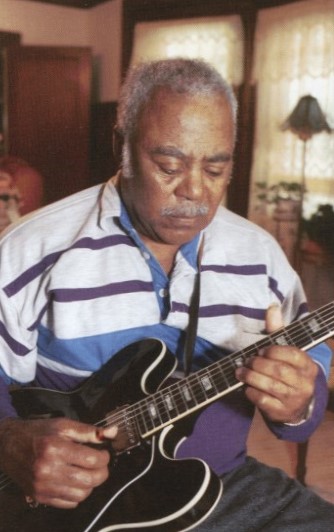Art Form: Blues music
Location(s): Detroit (Wayne County)
Eddie Burns

Eddie "Guitar" Burns playing one of his guitars; photo by Al Kamuda
Eddie "Guitar" Burns (1928-2012) carried the torch of African-American blues in Detroit from 1948 until his passing. His presentation of the early country blues styles in a contemporary band setting was unique in Michigan. Although he took his blues singing, guitar playing, and harmonica playing to Washington, D.C. and on European tours, Eddie was the only pure blues musician to live and perform continuously in Michigan.
Eddie grew up in the small Mississippi Delta towns of Wells and Dublin, where he heard country blues recordings in his grandfather's juke joint and listened to his father play blues on harmonica, guitar, and piano. His greatest influences from country blues recordings came from Tommy McClennan, Memphis Minnie, and Big Bill Broonzy on guitar and from John Lee "Sonny Boy" Williamson on harmonica. The harmonica was Eddie's first instrument as a boy. Playing "one string guitar" on the side of the house led Eddie to playing the six-string guitar.
After teaming up with blues guitarist John T. Smith in Davenport, Iowa, Eddie moved with John to Detroit in 1948. They played blues at house parties and eventually began to back up John Lee Hooker in performances and on recordings. When Hooker began touring nationally, he groomed Eddie to fill in for him at clubs and in recording sessions. Eddie moved toward the modern blues guitar style of T-Bone Walker by the early 1950s, and he adapted to the R&B sounds coming out of Motown and Staz labels. As blues gained a worldwide revival in the late 1960s, Eddie began touring European countries, playing blues throughout the 1970s.
Eddie's album Detroit on the U.S. label Blue Suit shows his deep roots and originality. The recording features country blues standards like "Bottle Up and Go" and "Blue Jay (Fly Down South For Me)" performed with fresh band arrangements. Eddie acknowledges the shared repertoire that is the mark of country blues: "There ain't no notes that never been played before, you just rearrange them, in your own way." (1)
His maintenance of blues tradition while contributing new compositions and effects on the guitar and harmonica made Eddie Burns a key bearer of the living blues tradition.
(1) Burns, Eddie. Personal communication with Ruth Fitzgerald. 1994.





